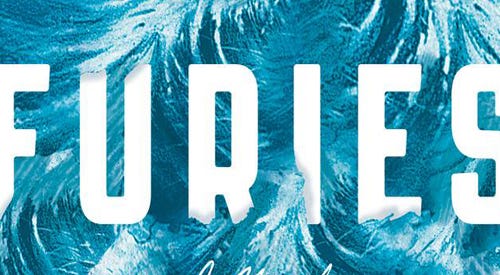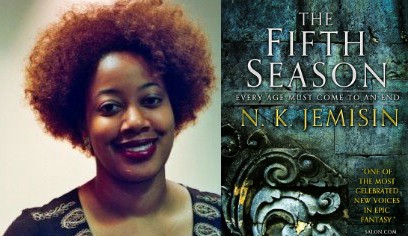Books & Culture
A Matter of Vision: Fates and Furies by Lauren Groff

by Zack Hatfield

Toward the end of Lauren Groff’s Fates and Furies, our narrator describes the “slow tango” of our galaxy with the Andromeda Galaxy, their inevitable collision. After they spin past each other, she writes:
“The long arms of both galaxies will reach longingly out and grasp hands at the last moment, and they will come spinning back in the opposite direction, their legs entwined but never hitting until the second swirl becomes a clutch, a dip, a kiss. And then, at the very center of things, when they are at their closest, there will open a supermassive black hole.”
Although we are not told so explicitly, the passage is to be understood as a metaphor for marriage — or at least the marriage that is explored in Groff’s novel, a both expansive and introspective realist fable of passion and compromise. Groff knows that it is at a relationship’s core where a certain darkness sleeps, one that can either reinforce or dissolve a union. Or, in the case of Lancelot and Mathilde — the two main characters of the novel — do both simultaneously.
Cradle-to-grave novels require the kind of ambitious, ambiguous specificity Groff wields. Rather than describing every year of her characters’ lives, an ensemble of scenes, moments and memories are utilized to great effect. In the first half of the book, Fates, we follow Lancelot — ironically called “Lotto” — through a thicket of traumas and life-defining moments, starting with his birth during the eye of a hurricane in Florida. A boisterous college party introduces us to Mathilde, a lanky girl whose beauty relies on a magnetic oddness. She lurks in the background during this first part, though we can sense the galaxy of her love slowly colliding with Lotto’s, all through his aspiring and failed dreams of becoming an actor, and then his victorious triumph as a New York City playwright.
Over the course of almost four hundred pages, the book whisks us through childhoods spent in Florida beaches and Pennsylvania emptiness, eventually taking us to the nineties and carrying us into present day, all while glimpsing Manhattan art galleries, operas, colleges, dim theaters, the glamorous filth of Paris. With deft vision, Groff considers grief, jealousy, parenthood, the power dynamic between spouses and the misery that accompanies art and those who make it. “Tragedy, comedy. It’s all a matter of vision,” Groff writes.
Although not obligatory, knowing some context about mythology certainly illuminates the trajectory of the novel. Take, for instance, the Fates (or Moirai) of Greek mythology — a trio of sister deities that governed a life from birth to death. At birth, Lotto lived with his father Gawain, his mother Antoinette and his aunt Susanna. These people, in many ways, steadily guide Lotto’s destiny. But his childhood friend Chollie — a gluttonous, calculating tycoon whose name bears similarity to Clotho, one of the Greek Fates — shapes Lotto’s perception just as much as anyone else. The Fates here could be a variety of people. After meeting the novel’s extravagant cast of characters, Lotto rarely appears in control of his own life. He seems to realize this too, as in this passage:
“Up before Lotto rose a vision of himself as if attached to a hundred shining strings by his fingers, eyelids, toes, the muscles of his mouth. All the strings led to Mathilde’s pointer finger, and she moved it with the subtlest of twitches and made him dance.”
On one hand, it’s hard to ignore that the author herself is the Fates, especially when Groff inserts her own asides in brackets throughout the text, a wink at the traditional Greek chorus. But this passage also foregrounds the idea of performance that’s so crucial to empathizing with Mathilde and Lotto. Aside from the actual world of New York dramaturgy Lotto becomes apart of, there is another theater Groff is intent on exploring — a theater of life. How much of someone’s identity is simply acting? Why do we fall into complacency in our roles? To emphasize these questions, the novel’s dramas are presented in a structure that mirrors that of theater. Groff’s scenes make temporal jumps that continuously renew intrigue during reading, and occasionally sections are presented in dialogue or include pieces of scripts that Lotto has written. These choices help stage the actions in equal light, and afford glimpses of the production inside Lotto’s mind.
As the axis on which Lotto’s “version” rotates is fate, the axis of Mathilde’s spins on Fury. The Furies in mythology are comprised of three goddesses who punish, among others, those who have harmed family members. It’s in this section where we learn that Mathilde too has faced her own share of scarring incidents, beginning with her unfortunate upbringing. In Groff’s modern fairy tale, she is a kind of Cinderella; after she meets Lancelot, her cheery, borderline alcoholic, Shakespeare-quoting prince, it’s hard to tell whether his presence is a curse or a salvation. As an artist he is granted fame that, while earned, partly belongs to his wife. He wants a child from a woman who does not want to bring one into the world. A foil against Lotto’s childlike innocence, Mathilde herself possesses a fury that is regularly stoked until their marriage becomes refined by fire.
A fascination with myth isn’t new to Groff, whose two earlier novels explored characters in similar ways. In her latest novel, mythic references reveal the parallels between myth and marriage: their grandiosities, their tracings of something from their inception to their memorable conclusion, their abiding lies and half-truths that inevitably turn into gospel. On the surface, Groff’s prose sparkles, but it also pulls the reader into a thick undertow of doubt and loss. Just like the surface of their marriage: a pristine shimmer that trembles from the deeper problems beneath.
Perched precariously atop the vertex of helplessness is a position Groff frequently puts her characters. In her marvelous short story “At the Round Earth’s Imagined Corners,” her protagonist is left adrift in a canoe in a marsh full of alligators. In Fates and Furies, an electricity shortage proves life threatening to Lotto during a writer’s winter retreat in a cabin. These dangerous situations form hinges in Groff’s stories, able to open deeper revelations within the character and the book. Sometimes they work, as in the short story. At certain instances in Fates and Furies, they can feel a tad too much like devices (then again, Groff seems to have no qualms letting the strings of her literary puppetry show). In addition to this, a minefield of secrets is perfectly set up to detonate when we least expect them, lending the novel the touch of a potboiler. While winning the hearts of beach readers and Midwestern book clubs, this always risks placing surprise over meaning. In the novel’s attempt at emotional complexity, its secrets and arguments just barely evade what is perhaps the most vexed literary crime — excessive melodrama.
What rescues Fates and Furies are Groff’s sentences, as always lithe and poetic, unrolling like a glimmering carpet to the gray and uncertain territory of her characters’ inner conflicts. She wields an almost-wizardly command of language, specifically metaphor. Each page contains sumptuous pieces of imagery. “A tiger of light” prowls in a bedroom in the morning. Tree branches are “stunned as soldiers after an ambush.” Mathilde’s blood is “humming like a beehive.” A memorable description opens one of the last chapters: “Mathilde had always been a fist, in truth. Only with Lotto had she been an open hand.” Fates and Furies, too, begins as a fist, its secrets clenched in its grasp. Once it is pried open, the secrets release like a magician’s doves. The hand is empty, and there is nothing left to offer.

by Lauren Groff










